Las 50 Mejores Baladas de Rock de Todos los Tiempos
Actualizado el: 2025-11-13 17:26:08
Sí, la música rock se trata de guitarras fuertes y cabeceo. Pero aquí está el asunto: algunos de los momentos más desgarradores en la historia del rock ocurren cuando las bandas bajan el volumen y se ponen emotivas. Las baladas de rock demuestran que los mismos músicos que pueden sacudir estadios pueden destruirte con una melodía tierna y letras crudas.
Desde el viaje de ocho minutos de Led Zeppelin hasta aquella vez que Guns N' Roses grabó a Slash tocando bajo la lluvia, las baladas de rock han acompañado de todo, bodas y sollozos en tu coche a las 2 AM. Funcionan porque son reales. No son solo canciones lentas—son experiencias emocionales que incluyen solos de guitarra brutales.
¿Qué Hace Realmente a Una Gran Balada de Rock?
No se trata solo de bajar el tempo y listo. Las verdaderas baladas de rock caminan por la cuerda floja entre la vulnerabilidad y el poder. Las letras son honestas sobre el amor, la pérdida o lo que te esté destrozando. Los cantantes muestran todo su rango. Pero a diferencia de las baladas pop que suelen reducirse a piano y voz, las baladas de rock mantienen las guitarras eléctricas y la batería—solo las usan con más inteligencia, creando tensión hasta que todo explota.
Cómo Evolucionaron las Baladas de Rock
Pioneros como Led Zeppelin y The Who a finales de los 60/inicios de los 70 trajeron influencias del blues y folk, creando temas introspectivos que probaron que no todo era volumen. Los 70 nos dieron epopeyas narrativas de Eagles y Lynyrd Skynyrd que podían durar hasta 9 minutos sin que nadie se quejara.
Entonces llegaron los 80. MTV lo cambió todo. Las bandas de rock de estadio encontraron la fórmula: empezar suave y vulnerable, ir subiendo, y luego EXPLOTAR en el estribillo. Añade un solo de guitarra capaz de hacer llorar a cualquiera y listo—balada poderosa al instante. Cada banda de glam metal necesitaba al menos una por disco. Era casi científico.
El grunge de los 90 dijo “no” a todo ese brillo y trajo la autenticidad cruda de vuelta. Pearl Jam y Alice in Chains crearon baladas más oscuras sobre adicción y depresión—nada de máquinas de viento ni producción teatral, solo honestidad dolorosa. Y eso impactó igual o más.
¿Ahora? Las baladas de rock modernas lo toman todo. Algunas bandas como Coldplay se inclinan por el piano y la introspección. Otras como Slipknot demuestran que incluso las bandas más pesadas pueden crear algo hermoso. La fórmula sigue cambiando, pero la base se mantiene: emoción honesta más instrumentación dinámica igual a lágrimas (de las buenas).
Cómo Escogimos Estas 50
Mira, todos tienen opiniones sobre cuál es la “mejor” balada. Nosotros revisamos:
- Impacto cultural - ¿Cambió el juego? ¿La gente sigue hablando de ella después de 20-40 años?
- La interpretación - Voces que te ponen la piel de gallina, solos de guitarra que te hacían imitar con la air guitar en el dormitorio
- Éxito comercial - Sí, las posiciones en listas importan. Estas canciones conectaron con millones por una razón
- La emoción - ¿Todavía funciona? ¿Puede hacer sentir algo real a alguien que no había nacido cuando salió?
- Reconocimiento de la crítica - ¿Qué opinan los periodistas musicales y la industria?
Esta lista cubre seis décadas y varios subgéneros. Hay elecciones obvias. Otras pueden hacerte decir “¿de verdad?” Y está bien. La música es algo personal.
🎵 Playlist Completa
Escucha las 50 canciones: Playlist en YouTube
Un Vistazo Rápido: El Top 10
- "Stairway to Heaven" - Led Zeppelin (1971)
- "Bohemian Rhapsody" - Queen (1975)
- "Hotel California" - Eagles (1977)
- "November Rain" - Guns N' Roses (1991)
- "Dream On" - Aerosmith (1973)
- "Don't Stop Believin'" - Journey (1981)
- "Free Bird" - Lynyrd Skynyrd (1973)
- "Faithfully" - Journey (1983)
- "With or Without You" - U2 (1987)
- "Nothing Else Matters" - Metallica (1992)
El Ranking Completo
LOS INMORTALES (#1-10)
#1. "Stairway to Heaven" – Led Zeppelin (1971)
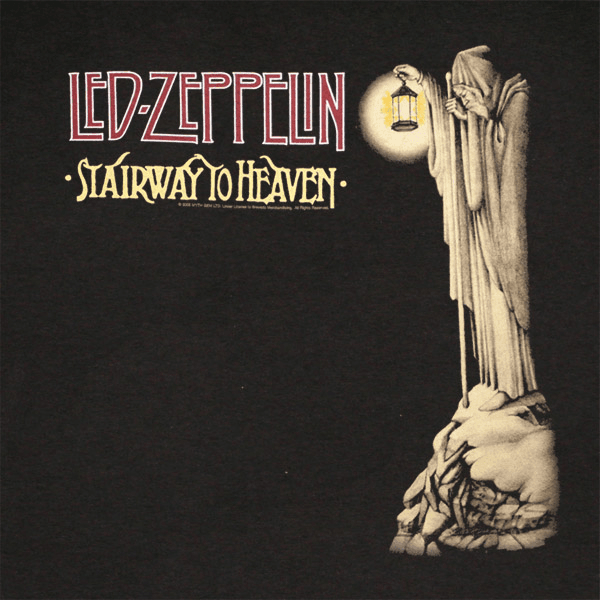
Álbum: Led Zeppelin IV | Lanzamiento: Noviembre 1971 | Mejor posición: Nunca lanzada como sencillo | Autores: Jimmy Page, Robert Plant
🎵 Escuchar:Stairway to Heaven
Hay una razón por la que siempre encabeza prácticamente todas las listas de “las mejores canciones de rock” que existen. Este viaje de ocho minutos comienza con delicados arpegios acústicos y una flauta dulce (sí, una flauta dulce), y poco a poco se convierte en uno de los solos de guitarra más intensos de la historia. Jimmy Page prácticamente escribió un manual sobre cómo crear tensión musical durante ocho minutos sin perder la atención de nadie.
¿Las letras de Plant sobre una mujer que compra su camino al cielo? Aún se debaten 50+ años después. Nadie sabe exactamente qué significa, y sinceramente, eso es parte de su magia. La canción se desenvuelve como una historia completa—el comienzo suave solo con guitarra acústica y flauta, la lenta incorporación de elementos eléctricos, luego entra la batería de Bonham, y finalmente... ESE solo. Page transmite pura emoción con su Les Paul durante dos minutos seguidos.
Dato curioso: Plant escribió la mayor parte de estas letras de una sola sentada en Headley Grange, un antiguo hospicio donde estaban grabando. Él dice que fue casi místico lo rápido que salió. Y a pesar de que Led Zeppelin se negó a lanzarla como sencillo—iban en contra del concepto de sencillos—se convirtió en la canción más reproducida en la historia de la radio. Más de 2 millones de emisiones para el año 2000.
La huella cultural es una locura. La han versionado todos, desde Dolly Parton hasta Frank Zappa. "Wayne's World" convirtió el “No Stairway” en un chiste que todo guitarrista entiende. Con sus 8:02, es la canción más larga que ha tenido rotación regular en la radio, lo que prueba que cuando algo es tan bueno, todas esas reglas de formato no importan. Ésta no es solo la mejor balada de rock—es la música rock rompiendo sus propios límites y triunfando.
#2. "Bohemian Rhapsody" – Queen (1975)
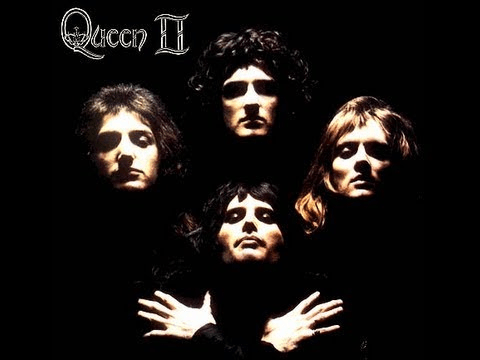
Álbum: A Night at the Opera | Lanzamiento: Octubre 1975 | Mejor posición: #1 UK, #9 US | Autor: Freddie Mercury
🎵 Escuchar:Bohemian Rhapsody
Freddie Mercury escribió una ópera rock de seis minutos que rompe todas las reglas de composición y, aún así, se convirtió en una de las canciones más queridas de todos los tiempos. Sin estribillo. Sin estructura tradicional. Letras que literalmente no tienen sentido. Y aún así—es perfecta.
El viaje por el que te lleva esta canción es una locura. Empieza con la voz de Freddie preguntando “¿Esto es la vida real?” Luego viene la sección balada al piano donde básicamente confiesa un asesinato. Después—giro inesperado—explota en esta sección operática con capas y capas de voces armonizadas mencionando a Scaramouche, Galileo y Beelzebub. Luego pasa al rock más duro con Brian May haciendo un solo increíble. Y termina en el final sereno al piano. No debería funcionar. Pero funciona totalmente.
Grabarla casi los volvió locos. Tres semanas en estudio, 180 sobregrabaciones vocales solo para la parte operática—todo en cinta analógica, antes de la era digital. Algunas cintas pasaron por los equipos tantas veces que casi se volvieron transparentes. El productor Roy Thomas Baker y la banda llevaron la tecnología de grabación de los 70 al máximo.
Al principio los programadores de radio dijeron que era demasiado larga y rara para sonar. Luego el DJ Kenny Everett la puso 14 veces en dos días y el público se volvió loco, y listo. Fue #1 en el Reino Unido durante nueve semanas. Luego, tras la muerte de Freddie en 1991, volvió al #1. Y después “Wayne's World” la mostró a los chicos de la Generación X en 1992 y llegó al #2 en EEUU, 17 años después de su lanzamiento. Algunas canciones simplemente se niegan a desaparecer.
#3. "Hotel California" – Eagles (1977)
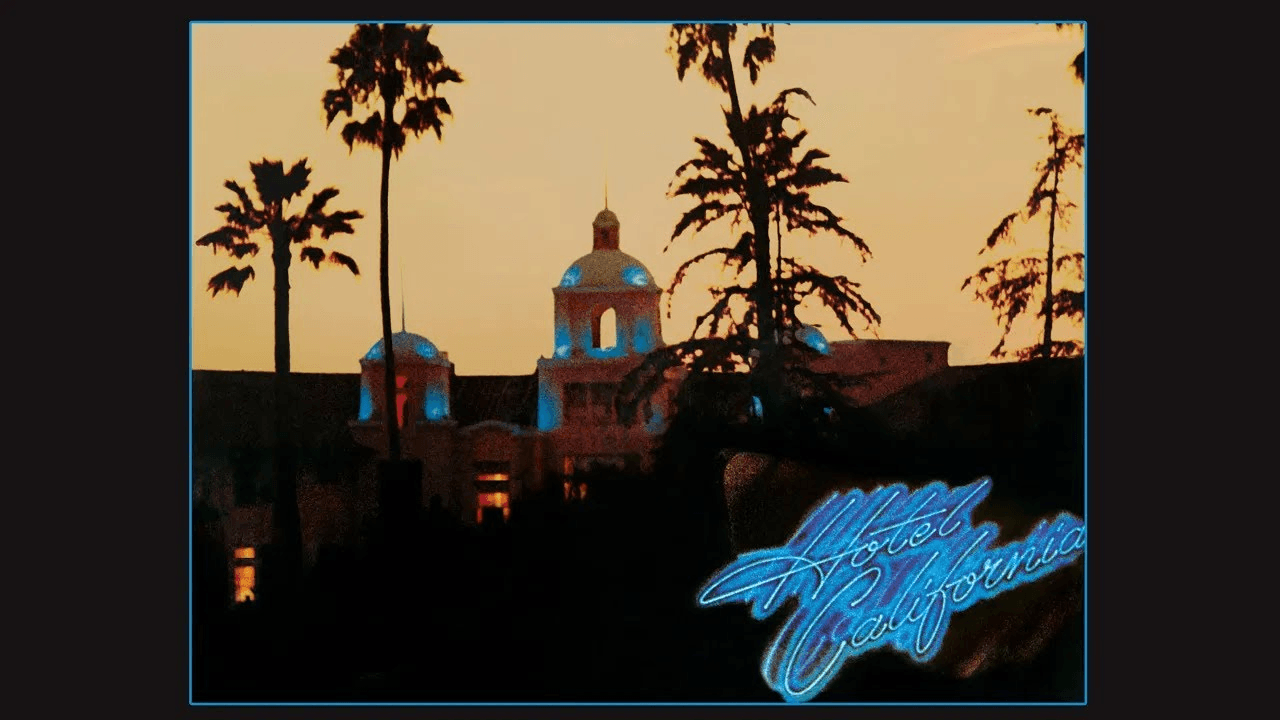
Álbum: Hotel California | Lanzamiento: Febrero 1977 | Mejor posición: #1 US | Autores: Don Felder, Don Henley, Glenn Frey
🎵 Escuchar:Hotel California
Pocas canciones capturan una época y un lugar como “Hotel California” retrata el exceso y la oscuridad del California de los años 70. El inquietante riff en Si menor de Don Felder crea un ambiente misterioso, y las letras de Don Henley pintan esta escena surrealista donde el sueño americano se vuelve siniestro. Además, esos solos gemelos de guitarra al final: son Don Felder y Joe Walsh conversando a través de sus instrumentos, y es absolutamente brillante.
La genialidad aquí es la ambigüedad. ¿Se trata de adicción a las drogas? ¿La trampa de la industria musical? ¿Un hotel literal y aterrador? ¿Todo lo anterior? La belleza es que funciona en cada nivel en el que quieras interpretarlo. "You can check out any time you like, but you can never leave"—esa línea se ha vuelto parte del lenguaje cotidiano.
Musicalmente, es una clase magistral de contención y desarrollo. Cada verso suma nuevos elementos—más guitarras, percusión, coros de fondo. Pero todos recuerdan esos últimos dos minutos. Felder y Walsh intercambiando solos de guitarra, sus líneas entrelazándose en perfecta armonía. Es virtuosismo técnico que está al servicio de la emoción y no solo para presumir.
Ganó el Grammy a Grabación del Año en 1978. Ha sido versionada en todos los estilos imaginables—reggae, flamenco, clásico. The Eagles la tocaron en prácticamente cada concierto, a menudo alargando aún más esos solos en vivo. La canción captura el momento exacto en que el sueño sesentero de paz y amor chocó con la dura realidad del cinismo y exceso de los setenta. Es un tema pesado para un éxito de radio, pero de alguna manera lo lograron.
#4. "November Rain" – Guns N' Roses (1991)
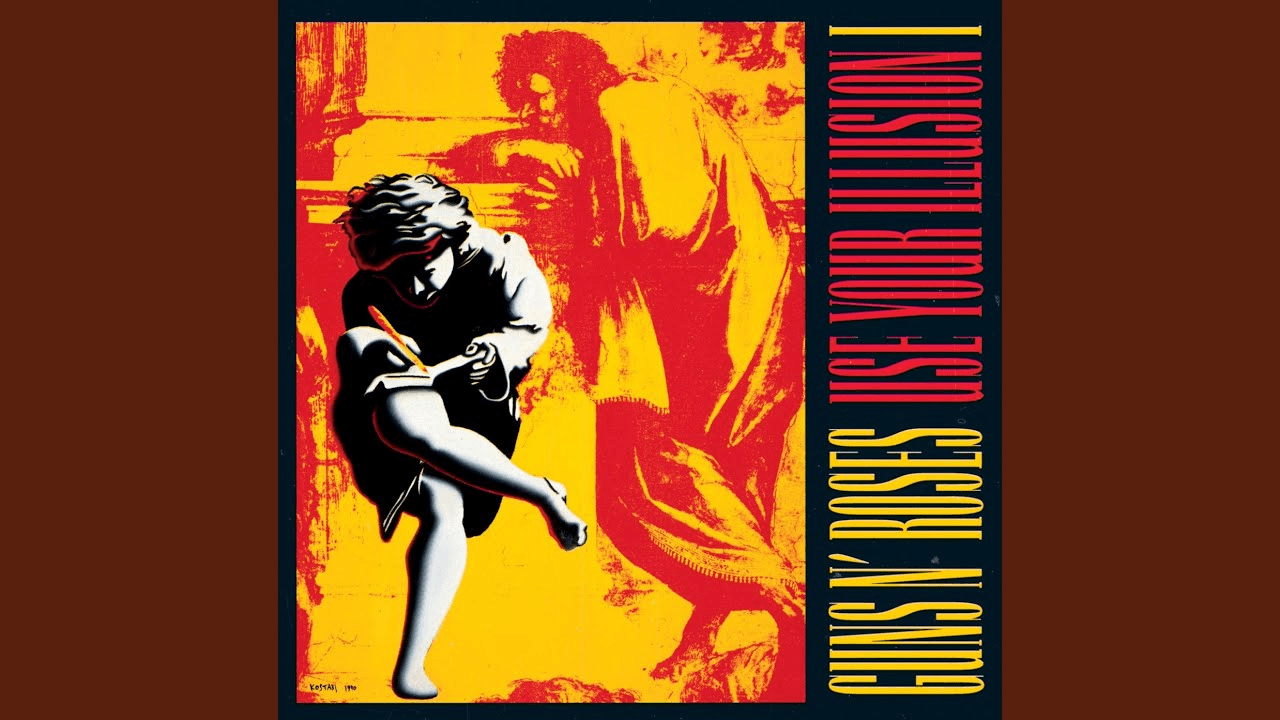
Álbum: Use Your Illusion I | Lanzamiento: Febrero de 1992 | Puesto máximo: #3 US | Autor(es): Axl Rose
🎵 Escuchar:November Rain
La épica de nueve minutos de Axl Rose con una orquesta de 50 músicos es el exceso del rock en su máxima expresión. Es una balada poderosa con esteroides—múltiples y dramáticos cambios de tono, el solo de Slash grabado mientras tocaba bajo la lluvia en un desierto (¿por qué no?), y letras sobre lo difícil que es hacer que el amor dure. Es completamente exagerada y absolutamente magnífica.
Lo genial es que puedes escuchar las influencias de la música clásica de Axl durante toda la canción. Ha citado a Elton John como una gran inspiración, y se nota en la composición. La canción avanza por diferentes movimientos como una pieza clásica. El primer solo de Slash es melódico y refinado. Su segundo solo—el famoso bajo la lluvia—es pura catarsis. Entonces la orquesta crece, entra el coro, y por un momento todo en el rock parece posible.
Esto tardó más de una década en completarse. Axl empezó a escribirla a principios de los 80, años antes de que GN'R fuera famoso. Las sesiones de grabación fueron brutales, con el perfeccionismo de Axl llevando a tomas interminables. Él mismo toca el piano en la versión final, y varios miembros de la banda contribuyeron en diferentes sesiones que duraron meses.
El videoclip costó más de 1.5 millones de dólares—uno de los más caros realizados en la época. Es un mini-filme con una boda, Stephanie Seymour, y esa icónica imagen de Slash saliendo de una iglesia para ponerse a tocar bajo la lluvia. MTV lo puso sin parar, y a pesar de salir justo cuando el grunge dominaba y todos supuestamente odiaban el rock de estadio, "November Rain" se convirtió en el sencillo de GN'R que más tiempo permaneció en las listas. A veces, lo grande SÍ es mejor.
#5. "Dream On" – Aerosmith (1973)
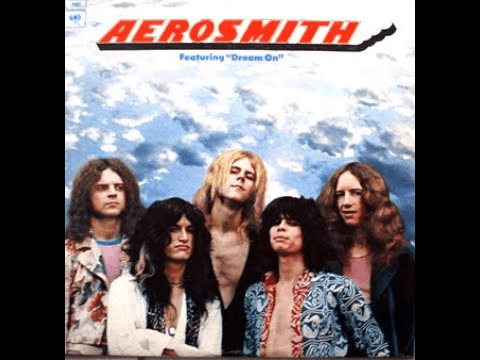
Álbum: Aerosmith | Lanzamiento: Junio de 1973 | Puesto máximo: #6 US (1976 re-lanzamiento) | Autor(es): Steven Tyler
🎵 Escuchar:Dream On
El sello discográfico de Steven Tyler pensaba que esto era demasiado lento, demasiado raro, no lo suficientemente comercial. Ya vemos lo que sabían. "Dream On" se convirtió en la canción emblemática de Aerosmith y contiene uno de los momentos vocales más impactantes del rock—ese grito en el último verso donde Tyler alcanza notas que la mayoría de los cantantes solo pueden soñar con lograr (juego de palabras intencionado).
Tyler la escribió en piano, inspirado al escuchar a su padre (un pianista clásico) practicar cuando era niño. Los versos son melancólicos y contemplativos, con Tyler cantando en su registro grave sobre envejecer y quedarse sin tiempo. Bastante profundo para una canción de rock. Pero luego va creciendo y creciendo, añadiendo guitarras y batería, hasta que Tyler desata ese grito agudo impresionante. Ese grito transforma toda la canción de una balada triste a un himno triunfal.
Cuando salió en 1973, no pasó nada. Literalmente, casi no entró en listas. Pero la estación de radio WBZ de Boston empezó a ponerla muchísimo en 1975-76, lo que hizo que Columbia la reeditara. Tres años después, finalmente alcanzó el puesto #6 y se convirtió en su primer gran éxito. A veces, las grandes canciones necesitan tiempo para encontrar a su público.
Las letras sobre la mortalidad y los sueños se han vuelto más profundas a medida que Tyler ha envejecido. Verlo aún intentar (y a menudo lograr) esas notas imposibles en sus 70—bueno, ese ES el mensaje de la canción, ¿no? Sigue soñando, sigue cantando, sigue empujando hasta que ya no puedas más. Es la declaración de principios de Aerosmith, y casi no llega a suceder porque algún ejecutivo del sello pensó que era "demasiado lenta".
#6. "Don't Stop Believin'" – Journey (1981)
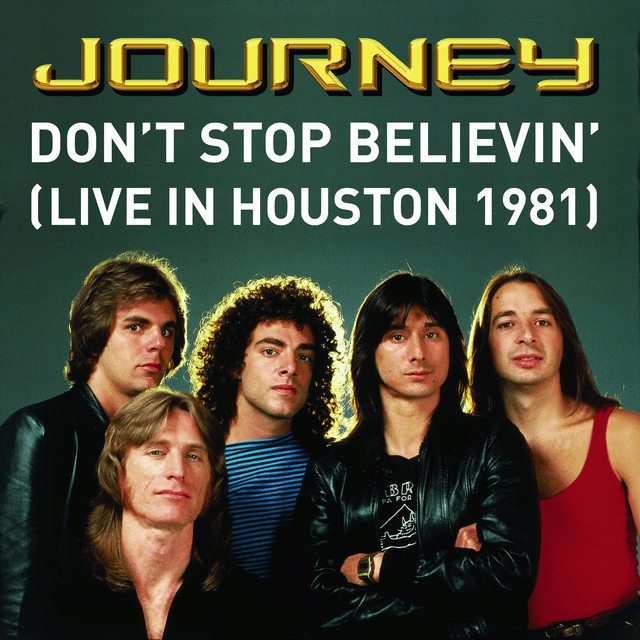
Álbum: Escape | Lanzamiento: Octubre de 1981 | Puesto máximo: #9 US (1981), #1 (2009 digital) | Autor(es): Jonathan Cain, Steve Perry, Neal Schon
🎵 Escuchar:Don't Stop Believin'
El himno definitivo de no rendirse nunca. La canción más famosa de Journey trata sobre jóvenes de pueblo persiguiendo sueños en la gran ciudad—básicamente la historia más universal de todas. La voz de Steve Perry se eleva, el riff de piano de Jonathan Cain es instantáneamente reconocible, y el trabajo de guitarra de Neal Schon complementa perfectamente sin opacar. ¿El resultado? Una canción que hace cantar a millones de personas a todo pulmón cada vez que suena.
Esto es lo que la hace interesante estructuralmente: el estribillo no llega hasta el final. Casi cuatro minutos después de que empieza. Esto debería ser una mala idea, pero funciona porque los versos son tan atractivos, pintando imágenes vívidas de "streetlight people" buscando algo más. Esa gratificación retrasada hace que el clímax sea aún mayor cuando por fin suena el "Don't stop believin', hold on to that feeling".
Jonathan Cain escribió el estribillo basándose en un consejo de su padre. Cuando el joven Cain luchaba con su carrera musical, su padre le dijo "Don't stop believin'." Esa simple frase, combinada con la maestría de Journey para el rock de estadios, creó una de las canciones más inspiradoras en la historia del rock. ¿El riff de piano que la inicia? Reconocible al instante—probablemente una de las cinco partes de teclado más famosas de todos los tiempos.
El resurgimiento cultural en los 2000 fue alucinante. "The Sopranos" usándola en esa escena final la presentó a gente que ni siquiera había nacido cuando salió. Después llegó "Glee". Se convirtió en el tema digital de catálogo más vendido. Lo que comenzó como un éxito sólido de Journey se transformó en un himno intergeneracional. Cuando suenan esas notas de piano, todos—y me refiero a TODOS—saben lo que viene.
#7. "Free Bird" – Lynyrd Skynyrd (1973)
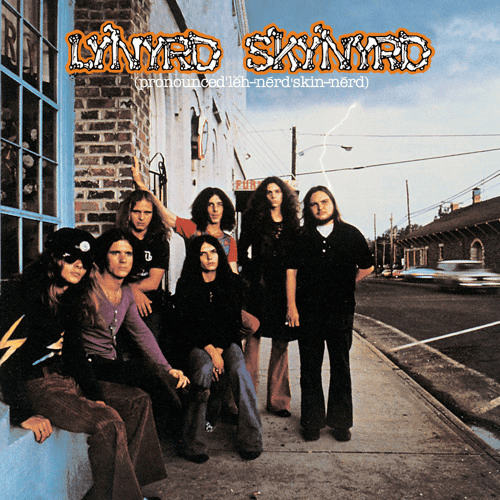
Álbum: (Pronounced 'Lĕh-'nérd 'Skin-'nérd) | Lanzamiento: Noviembre de 1974 | Puesto máximo: #19 US | Autor(es): Allen Collins, Ronnie Van Zant
🎵 Escuchar:Free Bird
Nueve minutos de duración. Solo de guitarra de cinco minutos. El himno sureño definitivo. "Free Bird" empieza como una balada suave sobre la necesidad de libertad, y luego se transforma en una de las exhibiciones de guitarra más impactantes jamás grabadas. Las guitarras enfrentadas de Allen Collins y Gary Rossington en ese desenlace extendido—eso es pura catarsis musical. Es una metáfora perfecta de romper las cadenas.
La historia del origen es en realidad emotiva. Allen Collins escribió la melodía de guitarra después de que su novia le preguntó qué haría si ella muriese. Una pregunta muy dura. Su respuesta fue esto. Ronnie Van Zant añadió letras sobre necesitar libertad, ser incapaz de cambiar—temas que realmente resonaron con las raíces sureñas y el espíritu rebelde de la banda. El resultado es simultáneamente tierno y desafiante.
No fue un éxito inmediato. Fue ganando seguidores poco a poco a través de la radio FM y legendarias actuaciones en vivo. Skynyrd alargaba el solo aún más en los conciertos—a veces hasta 14 minutos. La canción se asoció tanto a ellos que la gente gritaba "¡Free Bird!" en los shows. Luego eso se volvió un meme, apareciendo en conciertos de todo tipo, incluso los que no eran de rock. Probablemente sigue siendo el grito de concierto más famoso de todos los tiempos.
El trágico accidente de avión de 1977 que mató a Ronnie Van Zant, Steve Gaines y Cassie Gaines le dio a "Free Bird" un peso adicional. Se transformó de una canción sobre libertad en un homenaje para quienes murieron demasiado jóvenes. Cuando los miembros sobrevivientes se reunieron en 1987, cerraban todos los conciertos con "Free Bird", a menudo con videos tributo a sus hermanos caídos. Trata sobre libertad, pérdida, celebración y mantener la música viva. Todo en nueve minutos.
#8. "Faithfully" – Journey (1983)
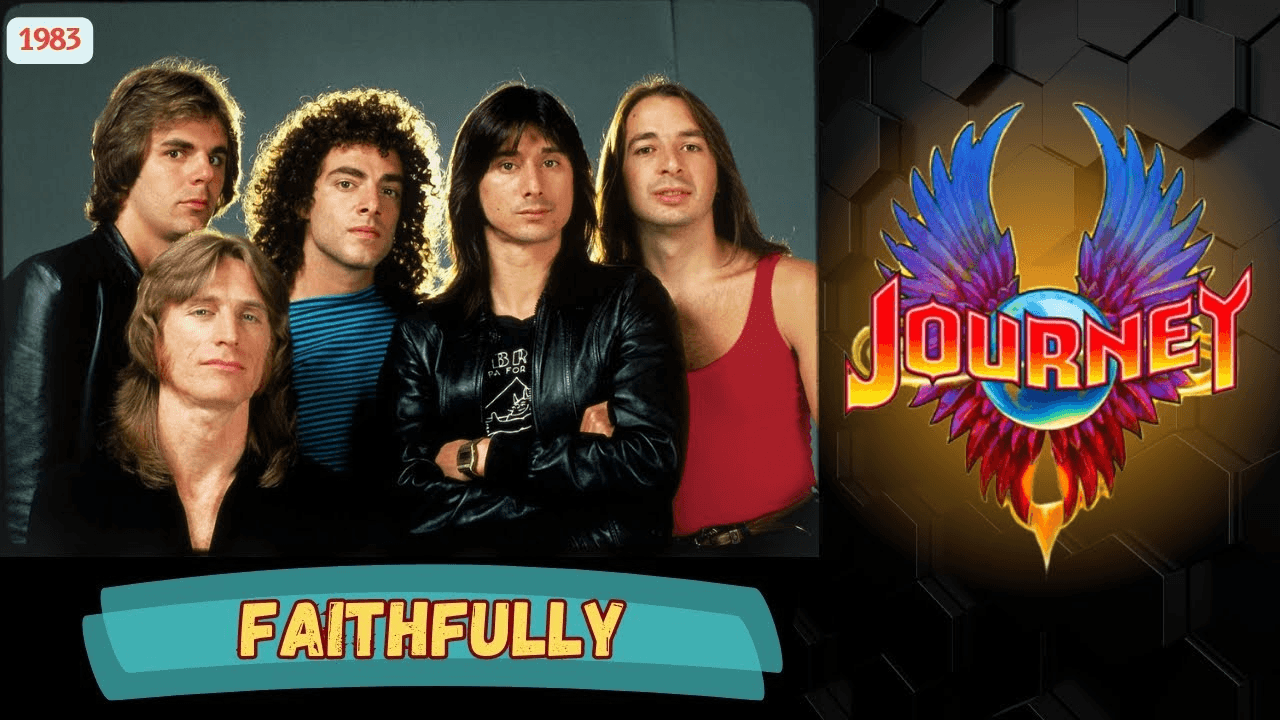
Álbum: Frontiers | Lanzamiento: Abril de 1983 | Puesto máximo: #12 US | Autor(es): Jonathan Cain
🎵 Escuchar:Faithfully
"Don't Stop Believin'" puede ser la canción más famosa de Journey, pero "Faithfully" es la más honesta. Jonathan Cain escribió esto sobre la tensión que genera el estar de gira en las relaciones: estar lejos de los seres queridos mientras se vive en un autobús, ciudad tras ciudad, sin regresar jamás a casa. La voz de Steve Perry es profundamente tierna. Duele, pero en el mejor sentido.
La melodía inicial del piano establece de inmediato este ambiente contemplativo. Esto no es el bombástico himno de otros éxitos de Journey. Es íntimo y vulnerable. Perry canta sobre "correr por la autopista bajo el sol de medianoche" y promete ser "siempre tuyo, fielmente", jurando devoción a pesar de circunstancias que lo hacen realmente, realmente difícil. El solo de guitarra de Neal Schon es sencillo y melódico, priorizando la emoción sobre la muestra técnica.
Aquí está la ironía: "Faithfully" se convirtió en una canción de bodas. Muy popular, de hecho. A pesar de tratar sobre las dificultades de mantener una relación cuando nunca se está en casa. Pero las parejas conectaron con la promesa principal: permanecer fieles ante la adversidad. Esa línea "Sigo siendo tuyo, siempre seré tuyo, por siempre tuyo... fielmente" se ha incluido en innumerables votos matrimoniales.
Alcanzó el #12 en el Billboard Hot 100. Sigue sonando fuerte en la radio clásica de rock. Prueba que el talento de Journey no era solo crear himnos para estadios—podían escribir letras personales y profundas envueltas en melodías hermosas. A veces, las baladas de rock más poderosas no duran nueve minutos con solos extendidos. A veces, todo lo que se necesita es honestidad, una gran melodía y una voz como la de Steve Perry.
#9. "With or Without You" – U2 (1987)
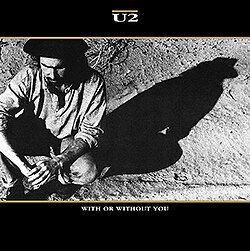
Álbum: The Joshua Tree | Lanzamiento: marzo de 1987 | Puesto Máximo: #1 US | Compositor(es): U2 (Bono, The Edge, Adam Clayton, Larry Mullen Jr.)
🎵 Escuchar:With or Without You
El éxito que llevó a U2 a la cima en Estados Unidos está construido completamente sobre la tensión y la contradicción. La guitarra infinita de The Edge (creada con un prototipo experimental que permite que las notas se sostengan para siempre) crea una base hipnótica mientras Bono explora el dilema de necesitar a alguien y sentirse atrapado por ese mismo deseo. ¿La genialidad? Construye emoción sin estallar jamás. Esa tensión se sostiene de principio a fin.
La innovación musical aquí es bastante salvaje. The Edge utilizó la Infinite Guitar, un dispositivo experimental que permitía que las notas resonaran indefinidamente, creando ese sonido brillante y de otro mundo. Combínalo con la línea de bajo melódica de Adam Clayton y la batería constante de Larry Mullen Jr., y tienes este paisaje sonoro hipnótico. Bono empieza vulnerable y va intensificando gradualmente, su falsete en el último verso representa ese punto de quiebre emocional.
Las letras de Bono capturan relaciones tóxicas donde el amor y el dolor están completamente entrelazados. "And you give yourself away"—¿es generosidad o pérdida de identidad? ¿Ambas? La ambigüedad es la clave. Funciona como canción de amor y como crítica al potencial destructivo del amor. La mayoría ha estado en relaciones complicadas, por eso esta canción resuena tanto.
Esto le dio a U2 su primer #1 en América, pasando tres semanas en la cima. Ayudó a que "The Joshua Tree" tuviera un éxito masivo y los presentó al público estadounidense sin sacrificar su credibilidad artística. La canción sigue sonando constantemente en streaming y es un punto central en sus conciertos. Demostró que las baladas de rock no necesitan solos de guitarra ni cambios de tonalidad dramáticos para ser poderosas—a veces la tensión sostenida supera la liberación.
#10. "Nothing Else Matters" – Metallica (1992)
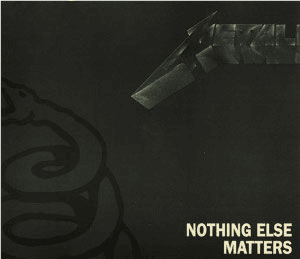
Álbum: Metallica (The Black Album) | Lanzamiento: abril de 1992 | Puesto Máximo: #11 US | Compositor(es): James Hetfield, Lars Ulrich
🎵 Escuchar:Nothing Else Matters
Metallica sorprendió absolutamente a sus fans del thrash metal con esta canción. La banda más pesada del metal creó algo increíblemente hermoso, demostrando que podían escribir baladas íntimas junto a temas sobre la guerra y la muerte. James Hetfield la escribió mientras hablaba por teléfono con su novia durante una gira, inicialmente manteniéndola en privado. La banda lo convenció de grabarla y boom—uno de sus mayores éxitos.
Comienza con la guitarra acústica de Hetfield tocando notas con los dedos. Ya con eso, los fans del thrash dicen "¿qué está pasando aquí?". Sus voces son tiernas, casi susurradas: "So close, no matter how far / Couldn't be much more from the heart". Los versos permanecen íntimos antes de que toda la banda entre, culminando en un arreglo orquestal en la sección final. El solo de Kirk Hammett es melódico y elegante, buscando el sentimiento sobre la velocidad. Es Metallica siendo vulnerables.
Algunos fans acérrimos los acusaron de venderse, de traicionar el metal por el éxito comercial. Pero la sinceridad de Hetfield es innegable. No es comercialismo calculado—es emoción genuina de alguien que normalmente canta sobre temas más oscuros. Las letras sobre confiar en uno mismo y ser fiel a los propios sentimientos resonaron mucho más allá del mundo del metal, acercando a millones de nuevos oyentes a Metallica.
El impacto cultural trascendió el rock. Orquestas clásicas la han versionado. Artistas acústicos la han versionado. Metallica la interpretó con la Sinfónica de San Francisco en su álbum "S&M", lo cual confirmó las cualidades clásicas de la canción. Se mantiene en rotación constante en la radio de rock y playlists de streaming, presentando a nuevas generaciones a Metallica a través de una entrada más suave. Resulta que vulnerabilidad y contundencia no son opuestos—a veces lo más valiente que puede hacer una banda de metal es mostrar que son humanos.
LOS INMORTALES (#11-25)
#11. "Wanted Dead or Alive" – Bon Jovi (1987)
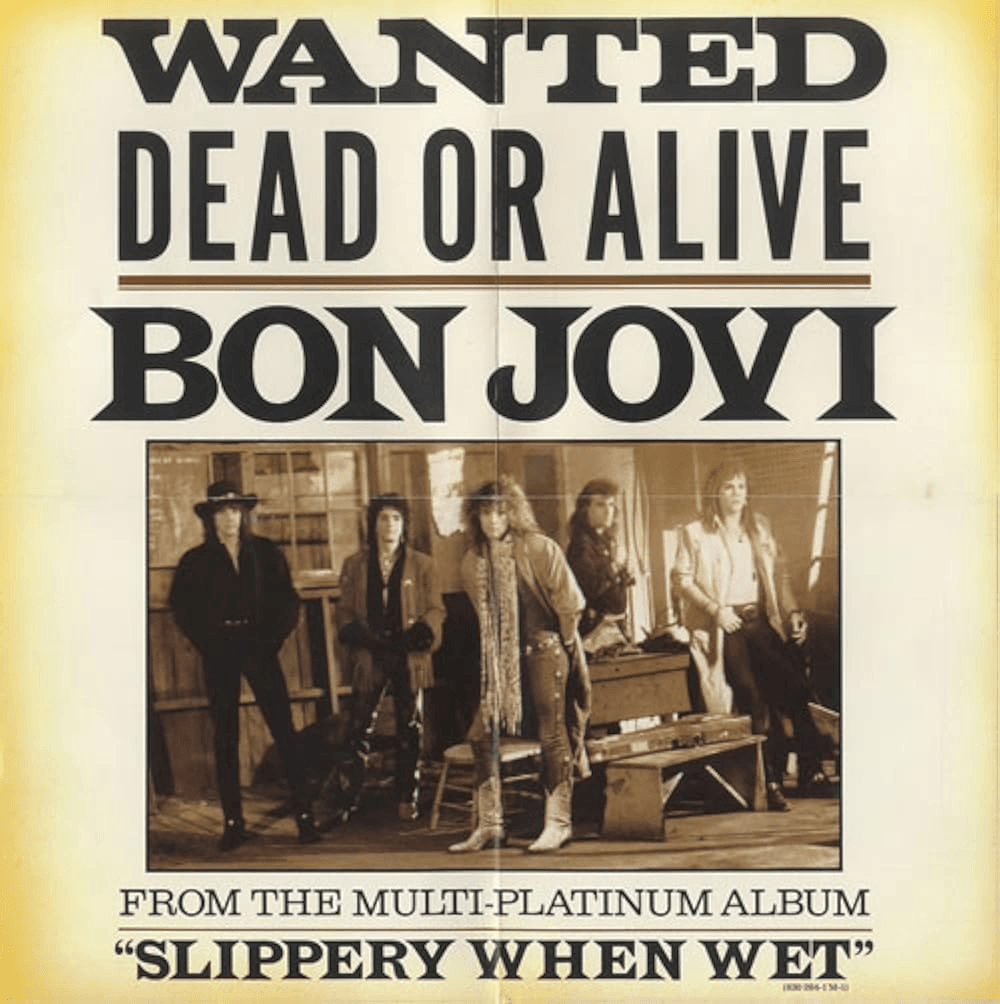
Álbum: Slippery When Wet | Lanzamiento: marzo de 1987 | Puesto Máximo: #7 US
🎵 Escuchar:Wanted Dead or Alive
Jon Bon Jovi comparó el ser músico de rock con ser un forajido del Viejo Oeste, y de alguna manera funcionó perfectamente. El riff de guitarra acústica de Richie Sambora y su solo con talk-box son instantáneamente reconocibles. "He visto un millón de caras y las he hecho vibrar a todas"—esa se transformó en la línea de fanfarronería definitiva de Bon Jovi. Es parte balada poderosa, parte canción de vaqueros, y de alguna forma completamente rock and roll.
#12. "Every Rose Has Its Thorn" – Poison (1988)
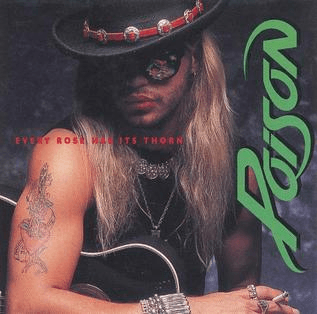
Álbum: Open Up and Say... Ahh! | Lanzamiento: octubre de 1988 | Puesto Máximo: #1 US
🎵 Escuchar:Every Rose Has Its Thorn
Bret Michaels la escribió en una lavandería tras una llamada difícil con su novia. Esa autenticidad se nota—es el único #1 de Poison y la balada poderosa que definió los últimos años de los 80. La metáfora es sencilla pero efectiva: las cosas bellas pueden lastimarte. A pesar de la imagen glam de Poison con maquillaje y licra, esto se siente auténtico. Resulta que incluso las bandas más exageradas pueden escribir canciones de ruptura con el corazón en la mano.
#13. "More Than a Feeling" – Boston (1976)
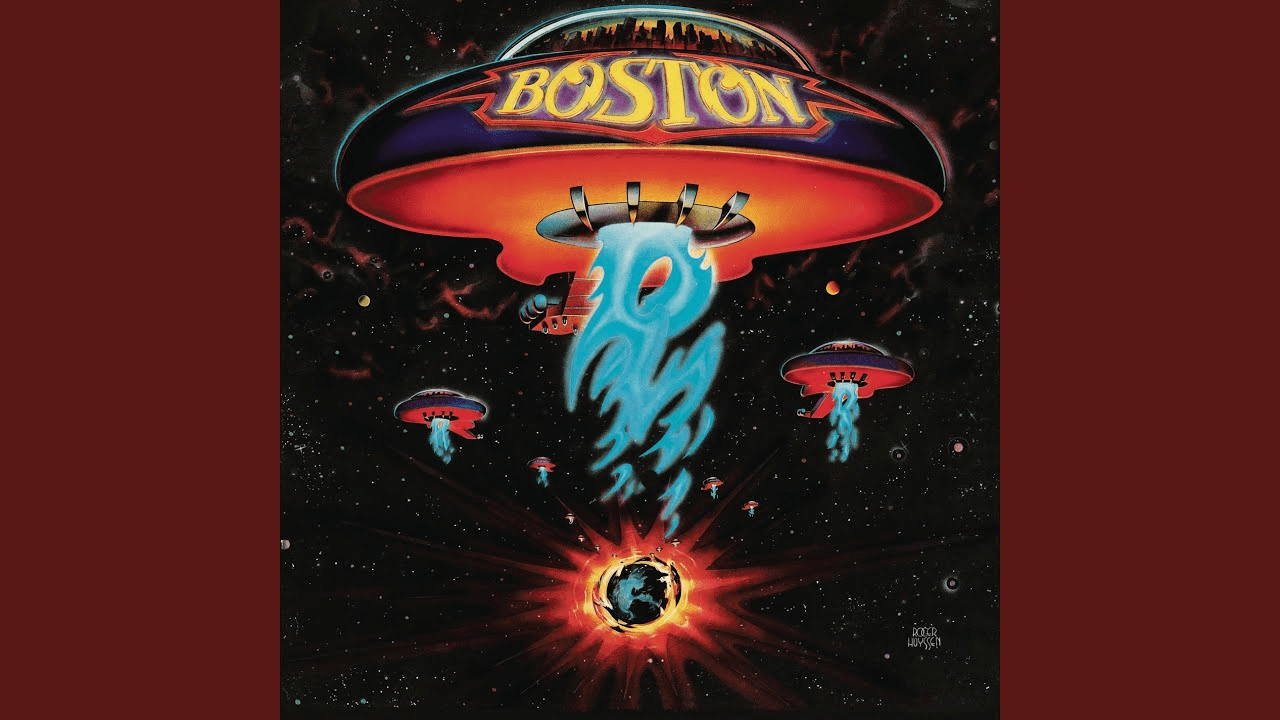
Álbum: Boston | Lanzamiento: septiembre de 1976 | Puesto Máximo: #5 US
🎵 Escuchar:More Than a Feeling
Tom Scholz pasó años en su estudio bajo tierra perfeccionando esto, añadiendo capas de guitarras hasta conseguir ese sonido característico de Boston. Técnicamente es más movida que una balada tradicional, pero "More Than a Feeling" capta la nostalgia a través de la voz elevada de Brad Delp. Las letras melancólicas sobre el amor perdido y cómo la música nos transporta al pasado conmueven a cualquiera que alguna vez se haya emocionado escuchando una canción vieja. Sigue sonando fuerte en la radio clásica de rock más de 45 años después.
#14. "Home Sweet Home" – Mötley Crüe (1985)
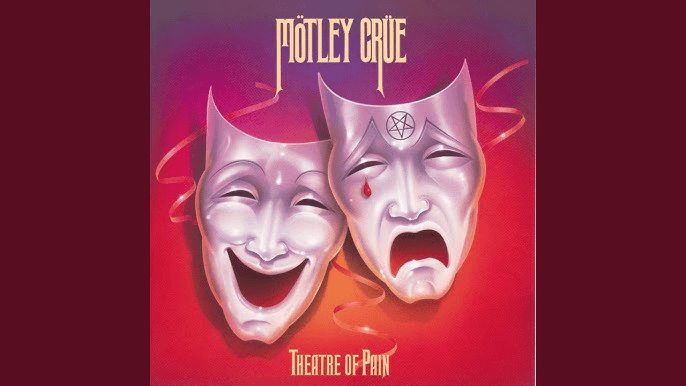
Álbum: Theatre of Pain | Lanzamiento: septiembre de 1985 | Puesto Máximo: #89 US (original), #37 (re-lanzamiento)
🎵 Escuchar:Home Sweet Home
La inesperada balada de los Crüe sobre extrañar el hogar durante las giras fue el gran momento de la banda en MTV. Vince Neil suena sorprendentemente tierno cantando sobre la añoranza de casa. El arreglo centrado en el piano y el video musical con filmaciones caseras y de conciertos conectaron muchísimo. Demostró que incluso los chicos malos más alocados del rock extrañan el hogar. Esto básicamente abrió la puerta para que todas las bandas de glam metal incluyeran una balada en sus discos durante el resto de los ochenta.
#15. "Black" – Pearl Jam (1991)
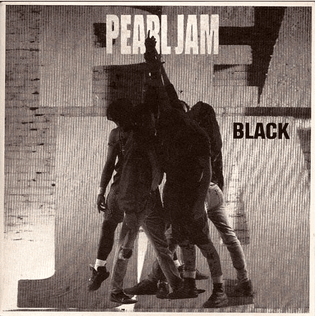
Álbum: Ten | Lanzamiento: diciembre de 1991 | Pico de posición: Nunca lanzado como sencillo
🎵 Escucha:Black
La desgarradora balada de Eddie Vedder sobre el amor perdido es el grunge en su estado más puro. La canción crece desde versos íntimos hasta un clímax poderoso y angustiado donde la voz de Vedder se quiebra con emoción real. El solo de guitarra de Mike McCready es hermoso y conmovedor. Pearl Jam se negó a lanzar "Black" como sencillo, reservándola como algo especial para los fans, lo que solo la hizo más legendaria. A veces, las canciones que no comercializas se vuelven las más queridas.
#16. "I Don't Want to Miss a Thing" – Aerosmith (1998)
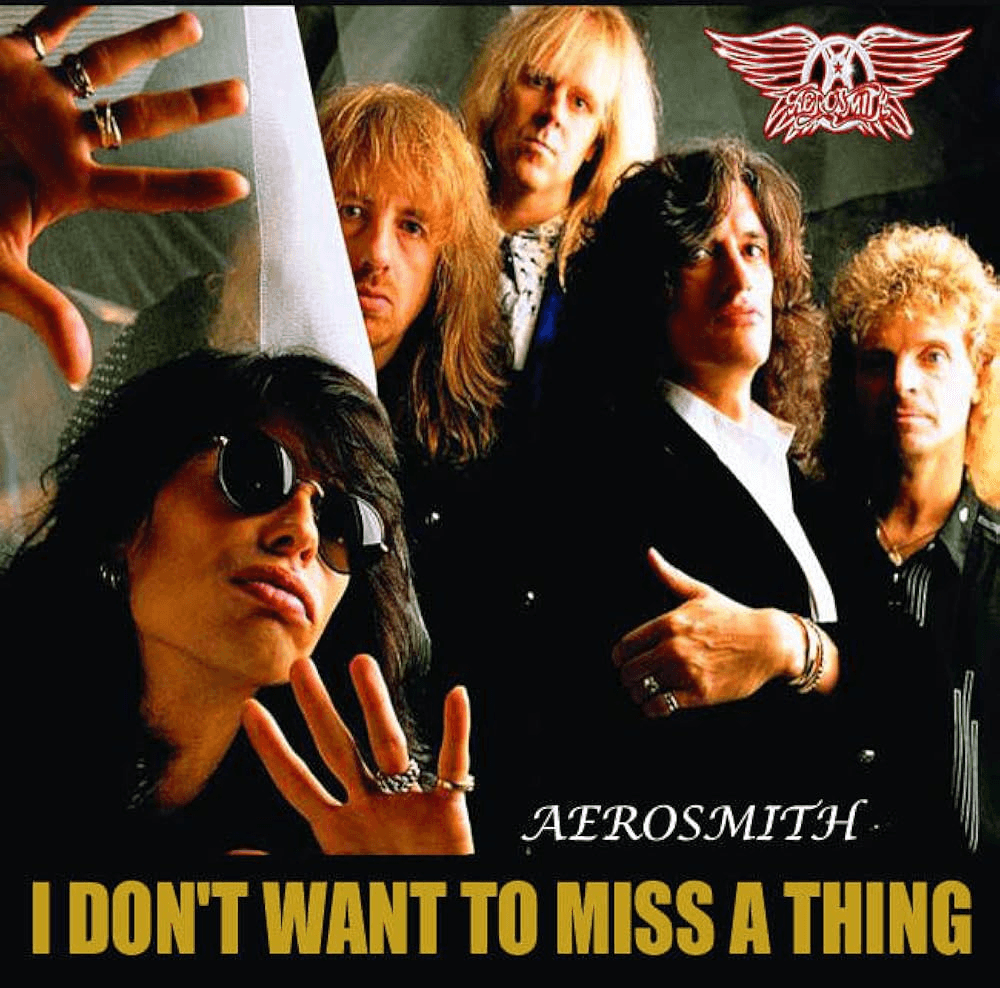
Álbum: Armageddon: The Album | Lanzamiento: agosto de 1998 | Pico de posición: #1 US
🎵 Escucha:I Don't Want to Miss a Thing
Diane Warren escribió esta canción para la banda sonora de "Armageddon", y se convirtió en el único éxito #1 de Aerosmith. La interpretación vocal más romántica de Steven Tyler, cantando sobre no querer perderse ni un solo momento con alguien a quien amas. El arreglo orquestal es enorme, la emoción es inmensa y, sí, algunos fans de toda la vida pensaron que era demasiado comercial. Pero presentó a Aerosmith a toda una nueva generación y sigue siendo una favorita en bodas.
#17. "Sister Christian" – Night Ranger (1984)
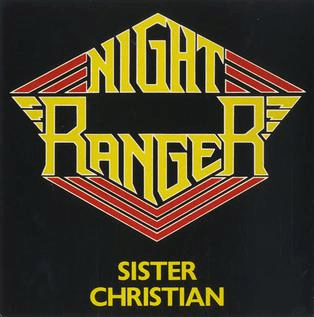
Álbum: Midnight Madness | Lanzamiento: junio de 1984 | Pico de posición: #5 US
🎵 Escucha:Sister Christian
La canción de Kelly Keagy sobre su hermana menor creciendo se convirtió en una de las baladas más queridas de los 80. Ese gancho de "motorin'", que es una metáfora de avanzar en la vida, la hizo tanto una balada como un himno. La producción con sintetizadores capturó perfectamente los 80. Tuvo una segunda vida después de que "Boogie Nights" la usó en esa tensa escena de trato de drogas, demostrando que las grandes canciones funcionan en cualquier contexto.
#18. "Love Bites" – Def Leppard (1988)
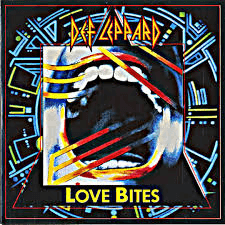
Álbum: Hysteria | Lanzamiento: agosto de 1988 | Pico de posición: #1 US
🎵 Escucha:Love Bites
El único éxito #1 de Def Leppard. Grabada durante las difíciles sesiones de "Hysteria" después de que el baterista Rick Allen perdió un brazo, "Love Bites" es un ejemplo perfecto de pop-metal pulido. Las armonías vocales en capas, la interpretación emotiva de Joe Elliott y la producción impecable de Mutt Lange, cada elemento suena costoso. Dominó la radio en 1988 y demostró que Def Leppard podía crear un rock comercial impecable.
#19. "Here I Go Again" – Whitesnake (1987)
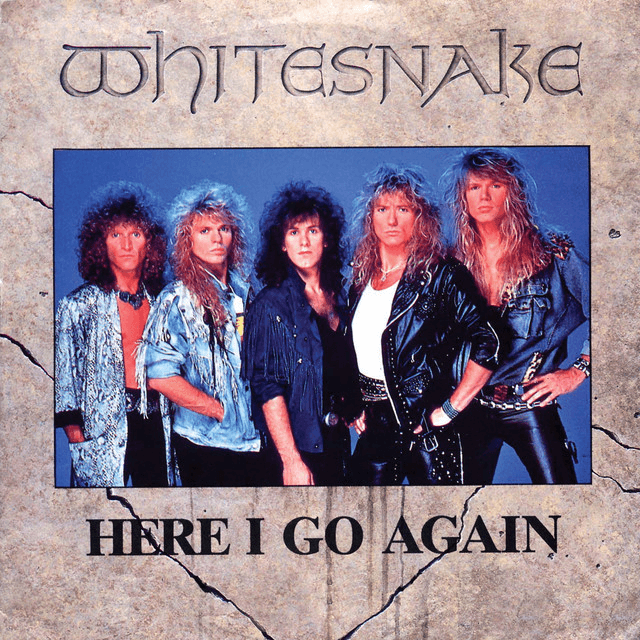
Álbum: Whitesnake (versión 1987) | Lanzamiento: febrero de 1987 | Pico de posición: #1 US
🎵 Escucha:Here I Go Again
Originalmente grabada en 1982, la versión de 1987 se convirtió en la canción emblemática de Whitesnake. Las sentidas voces de David Coverdale sobre caminar solo y seguir tu propio camino conectaron con cualquiera que busque independencia. Ese riff de teclado es inolvidable. ¿Y el video musical con Tawny Kitaen sobre los capós de los autos? Oro de MTV. Ayudó a llevarla al #1 y la hizo una de las canciones definitorias de 1987.
#20. "Patience" – Guns N' Roses (1989)
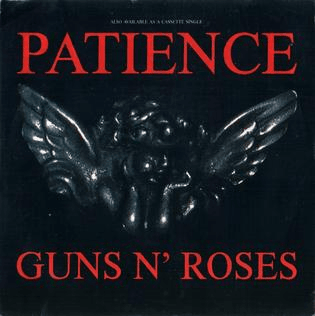
Álbum: G N' R Lies | Lanzamiento: abril de 1989 | Pico de posición: #4 US
🎵 Escucha:Patience
GN'R demostró que podían crear belleza sin electricidad. La introducción silbada, guitarras acústicas en capas y Axl Rose sonando genuinamente vulnerable: esto era completamente diferente de su sonido hard rock. El mensaje sobre la necesidad de paciencia en las relaciones y en la vida conectó ampliamente. El sutil solo acústico de Slash y las armonías de la banda son impresionantes. Alcanzó el #4 y probó que la simplicidad puede ser tan poderosa como la exageración eléctrica.
#21. "Wind of Change" – Scorpions (1990)
Álbum: Crazy World | Lanzamiento: enero de 1990 | Pico de posición: #4 US
🎵 Escucha:Wind of Change
Escrita sobre la caída del Muro de Berlín, se convirtió en un himno de cambio político y esperanza. La melodía silbada de Klaus Meine es instantáneamente reconocible. Sus letras sobre "el viento de cambio soplando" capturaron el optimismo de principios de los años 90 por el fin de la Guerra Fría. La balada trascendió el rock, convirtiéndose en un referente cultural de un momento específico de la historia. Uno de los sencillos más vendidos y el mayor éxito mundial de Scorpions.
#22. "Is This Love" – Whitesnake (1987)
Álbum: Whitesnake | Lanzamiento: junio de 1987 | Pico de posición: #2 US
🎵 Escucha:Is This Love
David Coverdale se hace la pregunta que todo enamorado se plantea: ¿esto es realmente amor? La lujosa producción, el coro memorable y la interpretación sentida de Coverdale la convirtieron en el segundo mayor éxito de Whitesnake. Las guitarras en capas y el ritmo constante capturaron la perfección de la balada rock de los 80. MTV amaba el video (más Tawny Kitaen) y se volvió un imprescindible en bodas. Sigue siendo una de las canciones de amor más sonadas en la radio rock.
#23. "Open Arms" – Journey (1982)
Álbum: Escape | Lanzamiento: enero de 1982 | Pico de posición: #2 US
🎵 Escucha:Open Arms
La voz de Steve Perry en esta canción marcó un nuevo estándar para las baladas rock. El mensaje es simple pero poderoso: recibir de vuelta a un amor perdido con "los brazos abiertos". La melodía de piano de Jonathan Cain y las voces ascendentes de Perry crearon pura magia emocional. Pasó seis semanas en el #2 (impedida de llegar al #1 por "I Love Rock 'n' Roll" de Joan Jett) y se convirtió en el mayor éxito crossover adulto contemporáneo de Journey. Todos, desde Mariah Carey hasta Barry Manilow, la han versionado.
#24. "Babe" – Styx (1979)
Álbum: Cornerstone | Lanzamiento: diciembre de 1979 | Pico de posición: #1 US
🎵 Escucha:Babe
Dennis DeYoung escribió "Babe" para su esposa, creando el único éxito #1 de Styx. La balada centrada en el piano, con letras de amor directas, la hizo enorme tanto en la radio rock como pop. Algunos fans de Styx querían más hard rock, pero "Babe" les trajo éxito masivo y demostró su versatilidad. Estuvo dos semanas en el #1. ¿El mensaje? A veces, solo decir "Cariño, te amo" es suficiente.
#25. "The Unforgiven" – Metallica (1991)
Álbum: Metallica (The Black Album) | Lanzamiento: noviembre de 1991 | Pico de posición: #35 US
🎵 Escucha:The Unforgiven
La segunda balada de Metallica en "The Black Album" invierte su estructura habitual: comienza pesada y pasa a secciones acústicas. La letra de James Hetfield sobre un hombre que pasó su vida complaciendo a otros solo para morir amargado y solo es de lo más oscuro. El solo melódico de Kirk Hammett y la inquietante sección de metales crean algo cinematográfico. "The Unforgiven" demostró que "Nothing Else Matters" no fue casualidad: Metallica podía experimentar con la estructura sin perder fuerza emocional.
LOS ESENCIALES (#26-50)
#26. "Alone" – Heart (1987)
Álbum: Bad Animals | Lanzamiento: mayo de 1987 | Pico de posición: #1 US
🎵 Escucha:Alone
La poderosa voz de Ann Wilson demuestra por qué se la considera una de las mejores cantantes del rock. El tema—desear a alguien tanto que te duele físicamente—es universal. Wilson transmite vulnerabilidad y fuerza, y ese arreglo dramático hizo que fuera el mayor éxito de Heart. Su único #1. Demostró que las bandas de rock lideradas por mujeres podían dominar la radio mainstream de los 80.
#27. "Still Loving You" – Scorpions (1984)
Álbum: Love at First Sting | Lanzamiento: junio de 1984 | Pico de posición: #64 US
🎵 Escucha:Still Loving You
Klaus Meine suplicando sobre intentar salvar una relación moribunda mientras la guitarra de Rudolf Schenker construye hacia un clímax emocional. "¿Todavía te amo?" se convirtió en una de esas frases que golpean fuerte. Masiva en Europa, menos en Estados Unidos, pero es un clásico en recopilaciones de baladas poderosas en todo el mundo. Los Scorpions sabían cómo crear rock emocional.
#28. "To Be With You" – Mr. Big (1991)
Álbum: Lean Into It | Lanzamiento: Noviembre 1991 | Mejor Posición: #1 US
🎵 Escucha:To Be With You
Una banda de virtuosos crearon esta balada acústica, demostrando que la técnica y la sencillez pueden coexistir. La voz de Eric Martin y el mensaje esperanzador de estar ahí para alguien la convirtieron en un inesperado #1. La producción sencilla y la melodía pegajosa demostraron que incluso guitarristas como Paul Gilbert aprecian una balada acústica bien hecha.
#29. "Heaven" – Warrant (1989)
Álbum: Dirty Rotten Filthy Stinking Rich | Lanzamiento: Julio 1989 | Mejor Posición: #2 US
🎵 Escucha:Heaven
La balada de Jani Lane sobre el amor apasionado se convirtió en el mayor éxito y canción icónica de Warrant. La introducción acústica, el coro memorable y la interpretación sincera de Lane dieron en el clavo de la fórmula de la power ballad. El solo de C.C. DeVille añadió el toque roquero necesario. Pasó dos semanas en el #2 y se volvió una balada representativa del glam metal de finales de los 80, demostrando que el género iba más allá de los himnos fiesteros.
#30. "18 and Life" – Skid Row (1989)
Álbum: Skid Row | Lanzamiento: Junio 1989 | Mejor Posición: #4 US
🎵 Escucha:18 and Life
La poderosa voz de Sebastian Bach narra la trágica historia de "Ricky", un chico que mata a alguien accidentalmente y recibe una sentencia de 18 años a cadena perpetua. La estructura narrativa y el comentario social la elevaron por encima del glam metal típico. El trabajo de guitarra de Dave "The Snake" Sabo y la profundidad emocional demostraron que Skid Row tenía sustancia además de estilo. Un éxito comercial y crítico.
#31. "I Remember You" – Skid Row (1989)
Álbum: Skid Row | Lanzamiento: Noviembre 1989 | Mejor Posición: #6 US
🎵 Escucha:I Remember You
La tierna balada de Skid Row permitió a Sebastian Bach mostrar su lado sorprendentemente sensible. El arreglo dirigido por acústica y la voz melódica de Bach sobre recordar un amor pasado la convirtieron en su mayor éxito baladístico. La composición de Rachel Bolan y Dave Sabo creó algo genuinamente conmovedor, ayudando a Skid Row a ampliar su público más allá de los fans del hard rock.
#32. "Silent Lucidity" – Queensrÿche (1990)
Álbum: Empire | Lanzamiento: Noviembre 1990 | Mejor Posición: #9 US
🎵 Escucha:Silent Lucidity
Esta belleza del rock progresivo sobre el sueño lúcido presenta algunas de las orquestaciones más bellas en la historia de las baladas rockeras. La voz serena de Geoff Tate te guía a través del mundo de los sueños mientras la guitarra de Chris DeGarmo aporta profundidad emocional. Ganó dos nominaciones al Grammy y se convirtió en el mayor éxito de Queensrÿche, demostrando que el rock sofisticado aún podía triunfar comercialmente en los 90.
#33. "Everlong" – Foo Fighters (1997)
Álbum: The Colour and the Shape | Lanzamiento: Agosto 1997 | Mejor Posición: #42 US
🎵 Escucha:Everlong
El himno de Dave Grohl sobre un amor desesperado y absorbente se convirtió en la canción icónica de Foo Fighters. La versión del álbum es potente, pero la versión acústica revela la balada en su esencia. Las voces crudas de Grohl, expresando la necesidad de hacer durar una relación "everlong", calaron hondo en quienes han sentido esa desesperación por conectar. La canción más tocada de Foo Fighters, y con razón.
#34. "High and Dry" – Radiohead (1995)
Álbum: The Bends | Lanzamiento: Febrero 1995 | Mejor Posición: No entró en listas US
🎵 Escucha:High and Dry
La balada melancólica de Thom Yorke sobre abandono y traición. El propio Yorke la descarta por ser demasiado sencilla, pero los fans no están de acuerdo: su belleza simple y emoción honesta la hacen muy querida. La guitarra acústica, el ritmo suave y la voz vulnerable de Yorke crearon una balada alternativa perfecta. A veces, lo simple es lo necesario.
#35. "Photograph" – Def Leppard (1983)
Álbum: Pyromania | Lanzamiento: Febrero 1983 | Mejor Posición: #12 US
🎵 Escucha:Photograph
Aunque más movida que las baladas tradicionales, "Photograph" captura la nostalgia y el anhelo en sus letras sobre aferrarse a los recuerdos mediante fotos. La producción impecable de Mutt Lange y las armonías de Def Leppard crearon una de las canciones más radiables de los 80. Impulsó el éxito masivo de "Pyromania" y consolidó a Def Leppard como reyes del rock de estadios.
#36. "Lips of an Angel" – Hinder (2006)
Álbum: Extreme Behavior | Lanzamiento: Julio 2006 | Mejor Posición: #3 US
🎵 Escucha:Lips of an Angel
Esta balada post-grunge sobre hablar secretamente con tu ex mientras tienes pareja se hizo enorme a pesar (¿o gracias a?) de su premisa moralmente cuestionable. La voz rasposa de Austin Winkler y la melodía pegajosa hicieron que fuera imposible escapar de ella en la radio rock de los 2000. Demostró que las fórmulas clásicas de baladas rockeras aún funcionaban en la era moderna.
#37. "Far Behind" – Candlebox (1993)
Álbum: Candlebox | Lanzamiento: Julio 1993 | Mejor Posición: #18 US
🎵 Escucha:Far Behind
Escrita como homenaje a Andrew Wood (Mother Love Bone) y otros músicos perdidos por la adicción, es el más sentido réquiem del grunge. La voz emotiva de Kevin Martin y el arreglo simple y poderoso reflejaron el duelo de la escena de Seattle. Se convirtió en el mayor éxito de Candlebox y sigue siendo un conmovedor tributo a artistas que se fueron demasiado pronto.
#38. "Drive" – Incubus (2000)
Álbum: Make Yourself | Lanzamiento: Noviembre 2000 | Mejor Posición: #9 US
🎵 Escucha:Drive
La balada existencial de Brandon Boyd sobre tomar control de tu vida se convirtió en la revelación de Incubus. El ritmo suave, las letras filosóficas y la voz pulida de Boyd crearon algo a la vez relajante y provocador. Pasó del rock alternativo a la radio pop, presentando Incubus al público masivo sin perder su credibilidad alternativa.
#39. "Snuff" – Slipknot (2008)
Álbum: All Hope Is Gone | Lanzamiento: Septiembre 2008 | Mejor Posición: No entró en listas US
🎵 Escucha:Snuff
La banda más pesada del metal creó una de las baladas más vulnerables del rock. La canción acústica de Corey Taylor sobre dejar ir a alguien a pesar de seguir amándolo sorprendió a los fans que esperaban agresión. La voz cruda y emotiva de Taylor, junto al arreglo minimalista, demostraron que hasta bandas extremas pueden crear belleza desgarradora. Se convirtió en una elección inesperada para bodas. ¿Quién lo hubiera imaginado?
#40. "So Far Away" – Avenged Sevenfold (2010)
Álbum: Nightmare | Lanzamiento: Junio 2011 | Mejor Posición: #73 US
🎵 Escucha:So Far Away
Escrita como tributo a su fallecido baterista "The Rev", esta es la canción más emotiva de Avenged Sevenfold. La voz sentida de M. Shadows sobre extrañar a alguien que ya no está y el trabajo melódico de guitarra crean un homenaje potente. Resuena en cualquiera que haya perdido a alguien importante, siendo a la vez profundamente personal para la banda y universalmente relatable.
#41. "Seether" – Veruca Salt (1994)
Álbum: American Thighs | Lanzamiento: Octubre 1994 | Mejor Posición: #8 Modern Rock
🎵 Escucha:Seether
Las armonías de Nina Gordon y Louise Post en esta balada alt-rock sobre lucha interna crearon algo bellamente oscuro. Las dinámicas—versos tranquilos que explotan en coros potentes—capturaron perfectamente la estética alternativa de los 90. Estableció a Veruca Salt como compositoras genuinas con profundidad emocional, no solo como "esa banda femenina."
#42. "Interstate Love Song" – Stone Temple Pilots (1994)
Álbum: Purple | Lanzamiento: Septiembre 1994 | Posición máxima: #20 US
🎵 Escuchar:Interstate Love Song
El himno viajero de Scott Weiland esconde temas más profundos de escape bajo su ritmo enérgico. Es más movida que las baladas típicas, pero el núcleo emocional y la voz vulnerable de Weiland la califican como tal. El riff de guitarra brillante de Dean DeLeo y el coro pegadizo hicieron de esta una de las mayores éxitos de STP y un clásico de la radio rock de los 90.
#43. "Plush" – Stone Temple Pilots (1992)
Álbum: Core | Lanzamiento: Junio 1993 | Posición máxima: #29 US
🎵 Escuchar:Plush
El éxito que lanzó a STP combinó la estética grunge con la sensibilidad del rock clásico. Las voces teatrales de Scott Weiland, inspiradas en noticias sobre chicas desaparecidas, crearon algo inquietante y hermoso. El premio Grammy a Mejor Interpretación de Hard Rock ayudó a establecer a Stone Temple Pilots como la banda grunge más exitosa comercialmente. Sigue siendo su canción emblemática.
#44. "Nutshell" – Alice in Chains (1994)
Álbum: Jar of Flies | Lanzamiento: Enero 1994 | Posición máxima: #103 US
🎵 Escuchar:Nutshell
La devastadora balada de Layne Staley sobre aislamiento y adicción es una de las canciones más desgarradoras del grunge. El arreglo acústico y la voz angustiada de Staley crean algo casi insoportablemente triste. "If I can't be my own, I'd feel better dead"—esas palabras se volvieron proféticas y trágicas. Alice in Chains en su faceta más vulnerable, y sigue doliendo décadas después.
#45. "Black Hole Sun" – Soundgarden (1994)
Álbum: Superunknown | Lanzamiento: Mayo 1994 | Posición máxima: #44 US
🎵 Escuchar:Black Hole Sun
Las letras surrealistas y la melodía inquietante de Chris Cornell crearon una de las canciones más distintivas de los 90. La atmósfera psicodélica, la voz potente de Cornell y la guitarra monótona de Kim Thayil lograron algo simultáneamente bello y desconcertante. El extraño video musical se convirtió en una obsesión en MTV. Ganó un Grammy para Soundgarden y sigue siendo su canción más conocida, demostrando el genio creativo de Cornell.
#46. "Elderly Woman Behind the Counter in a Small Town" – Pearl Jam (1993)
Álbum: Vs. | Lanzamiento: Octubre 1993 | Posición máxima: Nunca se lanzó como sencillo
🎵 Escuchar:Elderly Woman Behind the Counter
El retrato de personaje de Eddie Vedder sobre una mujer que reflexiona sobre las decisiones de su vida se convirtió en un clásico para cantar en los conciertos de Pearl Jam. El arreglo acústico y la voz empática de Vedder sobre reconocer amigos de antaño y preguntarse "qué hubiera pasado si" resuena con quienes han sentido estancamiento. Aunque nunca fue sencillo, es de las canciones más queridas de Pearl Jam.
#47. "Fade to Black" – Metallica (1984)
Álbum: Ride the Lightning | Lanzamiento: Agosto 1984 | Posición máxima: No entró en listas
🎵 Escuchar:Fade to Black
La primera balada de Metallica sorprendió a los fanáticos del thrash con su introducción acústica y sus temas de desesperación. Las letras de James Hetfield sobre el suicidio (inspiradas por el robo de su equipo) fueron controvertidas pero indudablemente poderosas. La canción va de lo suave acústico a lo eléctrico demoledor, con los solos dobles de Kirk Hammett aportando catarsis. Estableció el modelo de balada metalera—sí, las bandas pesadas pueden explorar profundidad emocional.
#48. "The Scientist" – Coldplay (2002)
Álbum: A Rush of Blood to the Head | Lanzamiento: Noviembre 2002 | Posición máxima: #48 US
🎵 Escuchar:The Scientist
La balada de Chris Martin sobre el arrepentimiento en una relación posee una de las interpretaciones vocales más emotivas del rock moderno. El video musical filmado en reversa y la entrega suplicante de Martin en "Nobody said it was easy" crearon algo visualmente hermoso. El arreglo guiado por piano y las letras sinceras sobre querer volver al inicio hicieron de "The Scientist" una de las canciones más queridas de Coldplay.
#49. "When I See You Smile" – Bad English (1989)
Álbum: Bad English | Lanzamiento: Septiembre 1989 | Posición máxima: #1 US
🎵 Escuchar:When I See You Smile
El único #1 de este supergrupo reunió a Jonathan Cain y Neal Schon de Journey con John Waite en la voz principal. La composición de Diane Warren y la interpretación apasionada de Waite crearon la fórmula perfecta de la power ballad. El sencillo mensaje de cómo una sonrisa lo hace todo mejor llegó a mucha gente, dando a Bad English su mayor éxito antes de separarse.
#50. "Heaven" – Bryan Adams (1983)
Álbum: Cuts Like a Knife | Lanzamiento: Agosto 1983 | Posición máxima: #1 US
🎵 Escuchar:Heaven
El primer #1 de Bryan Adams capturó perfectamente el romance adolescente y la pasión. Coescrita con Jim Vallance, combina la voz rasposa de Adams con una melodía irresistible. "Baby you're all that I want, when you're lying here in my arms"—una declaración de amor pura que la convirtió en favorita para bailes de graduación en los 80. Aunque después tuvo éxitos mayores, "Heaven" sigue siendo una de las canciones más duraderas de Adams.
Menciones Honoríficas: 15 Más Que Vale la Pena Escuchar
Elegir solo 50 fue realmente difícil. Estas 15 quedaron cerca del corte pero merecen reconocimiento.
- "Always" – Bon Jovi (1994) – La épica romántica de Jon sobre el amor eterno cuenta con una orquestación dramática y una de sus interpretaciones más apasionadas. Gran balada de los 90.
- "Iris" – Goo Goo Dolls (1998) – La voz anhelante de Johnny Rzeznik y la intensidad creciente hicieron de esta una de las mayores canciones de los 90. Algunos debaten si es rock o alternativa, pero sin duda es excelente.
- "Wonderful Tonight" – Eric Clapton (1977) – La suave canción de amor de Clapton sigue siendo un clásico para bodas. Melodía sencilla y hermosa que ha resistido el paso del tiempo.
- "Crash Into Me" – Dave Matthews Band (1996) – La mayor balada de DMB tiene letras íntimas y la voz distintiva de Dave. Se volvió un básico de la radio rock de los 90.
- "More Than Words" – Extreme (1990) – Balada acústica de una banda hard rock que demostró que la sinceridad desnuda podía liderar las listas. Fue #1 y se convirtió en el sello de Extreme.
- "Tuesday's Gone" – Lynyrd Skynyrd (1973) – Bella balada de rock sureño con piano y guitarra slide. Capta la melancolía de dejar atrás y seguir adelante.
- "Layla (Unplugged)" – Eric Clapton (1992) – Clapton reimaginó su clásico del rock como balada acústica íntima, creando quizás algo más poderoso emocionalmente que la original.
- "Under the Bridge" – Red Hot Chili Peppers (1991) – Las letras personales de Anthony Kiedis sobre soledad en LA se convirtieron en el mayor éxito y la canción más emotiva de RHCP.
- "The One I Love" – R.E.M. (1987) – A pesar del título romántico, las letras de Michael Stipe son bastante oscuras. Pero la belleza melódica la hizo el éxito revelador de R.E.M.
- "Something in the Way" – Nirvana (1991) – La voz susurrada de Kurt Cobain y el arreglo minimalista crean uno de los momentos más inquietantes de "Nevermind". Ganó atención renovada tras aparecer en "The Batman".
- "Breakdown" – Tom Petty and the Heartbreakers (1977) – El sencillo debut de Petty demostró su talento para crear rock memorable, melódico y con profundidad emocional.
- "Dust in the Wind" – Kansas (1977) – Balada filosófica con guitarras acústicas y cuerdas que fue el mayor éxito de Kansas, a pesar de su tema existencial sobre la fugacidad de la vida.
- "Maybe I'm Amazed" – Paul McCartney (1970) – El tributo apasionado de McCartney a Linda es una de las mejores canciones de amor del rock. Voz poderosa y emoción honesta.
- "Tangled Up in Blue" – Bob Dylan (1975) – Más folk-rock que puro rock, pero la obra maestra narrativa de Dylan sobre una relación compleja merece mencionarse como una de las baladas rock más literarias.
- "Times Like These" – Foo Fighters (2003) – Otro himno de Foo Fighters sobre la perseverancia, con las letras reflexivas de Dave Grohl y la dinámica ascendente distintiva de la banda.
Baladas Rock Por Década
Los años 1960-1970: Años Fundamentales
A finales de los 60 y principios de los 70, las bandas empezaron a experimentar con dinámicas más suaves y letras introspectivas. Influenciados por el folk, el blues y los cantautores, pioneros como Led Zeppelin, Eagles y Lynyrd Skynyrd demostraron que los músicos de rock podían ser narradores sensibles. Estas primeras baladas a menudo presentaban guitarras acústicas, arreglos elaborados y duraciones extendidas—a veces 8-9 minutos sin que nadie se quejara.
Canciones como "Stairway to Heaven" y "Hotel California" no eran solo baladas—eran mini-épicas que demostraban que el rock podía ser arte. Estos músicos mostraban dominio técnico mientras exploraban una profunda carga emocional. Las estructuras eran progresivas, las letras a menudo místicas o filosóficas, y las influencias del blues eran profundas.
Canciones esenciales de nuestra lista:
- "Stairway to Heaven" - Led Zeppelin (#1)
- "Bohemian Rhapsody" - Queen (#2)
- "Hotel California" - Eagles (#3)
- "Dream On" - Aerosmith (#5)
- "Free Bird" - Lynyrd Skynyrd (#7)
Artistas clave: Led Zeppelin, Eagles, Lynyrd Skynyrd, The Who, Queen, Aerosmith, Pink Floyd
Esta era estableció que las bandas de rock podían crear arte con éxito comercial. Estas no eran simples canciones de relleno—eran declaraciones de ambición artística que influenciaron todo lo que vino después.
Los 80: Explosión de Power Ballads
Los 80 transformaron las baladas rockeras en "power ballads"—una fórmula específica que dominó la década. El medio visual de MTV les dio a las baladas un nuevo poder promocional. Las bandas de rock de estadios perfeccionaron la estructura: versos suaves y vulnerables que crecían hasta estribillos explosivos y llenos de energía. Los sintetizadores, guitarras superpuestas y producciones masivas definieron este sonido.
La fórmula se volvió casi científica. Comenzar con piano o guitarra acústica, sumar voces vulnerables, construir la tensión, luego EXPLOTAR en el estribillo con toda la banda y coros de fondo. Incluir un solo de guitarra para el clímax emocional. Las mejores power ballads equilibraban la fórmula con emoción genuina. Las bandas menos lograban solo seguían la receta sin corazón.
Las bandas de glam metal descubrieron que las baladas podían ser oro tanto artística como comercialmente. Prácticamente cada álbum necesitaba al menos una. Algunas bandas fueron acusadas de escribir baladas solo para la radio, pero las mejores—como "Every Rose Has Its Thorn" o "Faithfully"—aún se sienten genuinas décadas después.
Canciones esenciales de nuestra lista:
- "November Rain" - Guns N' Roses (#4)
- "Faithfully" - Journey (#8)
- "Nothing Else Matters" - Metallica (#10)
- "Wanted Dead or Alive" - Bon Jovi (#11)
- "Every Rose Has Its Thorn" - Poison (#12)
- "Home Sweet Home" - Mötley Crüe (#14)
- "Sister Christian" - Night Ranger (#17)
Artistas clave: Bon Jovi, Journey, Def Leppard, Whitesnake, Scorpions, Poison, Warrant, Mötley Crüe, Skid Row
Las power ballads de los 80 a veces son criticadas por ser demasiado formularias o dramáticas. Pero los mejores ejemplos siguen siendo poderosamente emotivos e impresionantes musicalmente. Esta década demostró que la vulnerabilidad podía coexistir con la imagen masculina del rock.
Los 90: El Grunge lo Cambia Todo
El grunge de principios de los 90 rechazó los excesos de los 80 y devolvió la autenticidad cruda a las baladas rockeras. Bandas como Pearl Jam, Alice in Chains y Soundgarden crearon baladas más oscuras e introspectivas, despojadas de la teatralidad en la producción. Abordaron temas más pesados—adicción, depresión, alienación—con una honestidad brutal.
La producción se volvió más orgánica. Las emociones se volvieron más complejas y, a veces, incómodas. Bandas de rock alternativo como Radiohead y luego Foo Fighters sumaron variedad, demostrando que podían coexistir múltiples enfoques. Surgió el post-grunge y el rock moderno empezó a tomar forma.
El contraste con las power ballads de los 80 era marcado. No había ventiladores, ni producción perfecta, ni cambios dramáticos de tono. Solo honestidad dolorosa y emoción cruda. Canciones como "Black" y "Nutshell" se sienten más como confesiones que como actuaciones.
Canciones esenciales de nuestra lista:
- "Black" - Pearl Jam (#15)
- "Everlong" - Foo Fighters (#33)
- "Nutshell" - Alice in Chains (#44)
- "Black Hole Sun" - Soundgarden (#45)
- "Plush" - Stone Temple Pilots (#43)
- "Far Behind" - Candlebox (#37)
Artistas clave: Pearl Jam, Alice in Chains, Soundgarden, Stone Temple Pilots, Nirvana, Foo Fighters, Candlebox
Los 90 demostraron que las baladas rockeras no necesitaban fórmulas ni temer a la oscuridad. Estas canciones a menudo se sentían como sesiones de terapia hechas música, generando conexiones íntimas con oyentes que enfrentaban sus propias luchas.
2000s-presente: Evolución Moderna
Las baladas rockeras contemporáneas toman elementos de todas las épocas previas y agregan producción moderna e influencias diversas. Las bandas post-grunge, actos de metal moderno y artistas de indie rock aportan sus propias versiones. Coldplay aporta introspección al piano. Avenged Sevenfold y Slipknot demuestran que incluso las bandas más pesadas pueden crear belleza. Internet permite que las baladas lleguen a su público sin necesidad de la radio, lo que permite mayor experimentación.
Las baladas modernas suelen tener una producción más nítida, influencias de otros géneros (electrónica, hip-hop, indie) y a veces temáticas emocionales más complejas. La línea entre "balada rockera" y "balada alternativa" se ha difuminado, creando un paisaje diverso donde coexisten múltiples estilos.
Canciones esenciales de nuestra lista:
- "The Scientist" - Coldplay (#48)
- "So Far Away" - Avenged Sevenfold (#40)
- "Snuff" - Slipknot (#39)
- "Drive" - Incubus (#38)
- "Lips of an Angel" - Hinder (#36)
Artistas clave: Foo Fighters, Coldplay, Shinedown, Breaking Benjamin, Three Days Grace, Avenged Sevenfold
Las baladas rockeras siguen evolucionando manteniendo elementos fundamentales: honestidad emocional, riqueza musical y la capacidad de conectar personalmente con los oyentes. La tradición sigue viva y relevante.
Encuentra Tu Balada Rock Perfecta
Para el Desamor y los Tiempos Difíciles
Cuando enfrentas una pérdida o una ruptura dolorosa, estas canciones entienden tu dolor.
- "Every Rose Has Its Thorn" - Poison (#12) – La balada de ruptura definitiva sobre aceptar que las cosas hermosas duelen
- "Black" - Pearl Jam (#15) – La dolorosa aceptación de Eddie Vedder sobre el amor perdido y los recuerdos agridulces
- "Alone" - Heart (#26) – Ann Wilson expresa la soledad desesperada de querer a alguien
- "Nutshell" - Alice in Chains (#44) – La devastadora canción de Layne Staley sobre el aislamiento llega al fondo
- "Fade to Black" - Metallica (#47) – La balada más oscura del metal para cuando la tristeza es abrumadora
Momentos Épicos de Solo de Guitarra
Para quienes veneran a los dioses de la guitarra y aman cuando las baladas explotan en brillantez instrumental.
- "Stairway to Heaven" - Led Zeppelin (#1) – El solo de Jimmy Page sigue siendo el estándar oro
- "Free Bird" - Lynyrd Skynyrd (#7) – Cinco minutos de paraíso de guitarras duales
- "November Rain" - Guns N' Roses (#4) – El solo empapado en lluvia de Slash es puro cine
- "Hotel California" - Eagles (#3) – La conversación de guitarras entre Felder y Walsh es perfección
- "Wanted Dead or Alive" - Bon Jovi (#11) – El solo de talk-box de Richie Sambora define la guitarra rockera de los 80
Cantables en Viaje por Carretera
Ventanas abajo, volumen alto—estas canciones piden ser cantadas a todo pulmón.
- "Don't Stop Believin'" - Journey (#6) – El himno definitivo de la perseverancia
- "More Than a Feeling" - Boston (#13) – Es imposible no cantar junto a Brad Delp
- "Sister Christian" - Night Ranger (#17) – "Motorin'" por la autopista se siente perfecto
- "Here I Go Again" - Whitesnake (#19) – Ideal para viajes en solitario, caminando solo
- "With or Without You" - U2 (#9) – Intensidad creciente perfecta para trayectos largos
Canciones de Amor para Bodas
Lo suficientemente románticas para tu primer baile (si eres lo bastante cool para tener una boda rockera).
- "Faithfully" - Journey (#8) – La promesa definitiva de devoción pese a la distancia
- "Open Arms" - Journey (#23) – Expresión pura de recibir el amor de vuelta
- "Is This Love" - Whitesnake (#22) – El momento más romántico de David Coverdale
- "I Don't Want to Miss a Thing" - Aerosmith (#16) – No querer perderse ni un solo momento
- "Heaven" - Bryan Adams (#50) – Declaración romántica clásica
Joyas Ocultas Subestimadas
Para los verdaderos fanáticos del rock que aprecian las baladas más allá de los éxitos obvios.
- "Silent Lucidity" - Queensrÿche (#32) – Belleza progresiva sobre el sueño lúcido
- "Snuff" - Slipknot (#39) – Sorprendentemente vulnerable de los enmascarados locos del metal
- "Far Behind" - Candlebox (#37) – Sentido homenaje del grunge a músicos perdidos
- "Interstate Love Song" - Stone Temple Pilots (#42) – Profundidad oculta bajo guitarras vibrantes
- "Elderly Woman" - Pearl Jam (#46) – Estudio de personaje que se convirtió en coro de fanáticos
Estadísticas y curiosidades de las baladas rockeras
Analizamos las 50 canciones para encontrar patrones interesantes.
📊 Artistas más representados
- Journey: 3 canciones (#6, #8, #23) - La voz de Steve Perry nació para las baladas
- Metallica: 3 canciones (#10, #25, #47) - Las bandas pesadas también sienten
- Guns N' Roses: 2 canciones (#4, #20)
- Pearl Jam: 2 canciones (#15, #46)
- Aerosmith: 2 canciones (#5, #16)
- Stone Temple Pilots: 2 canciones (#42, #43)
- Whitesnake: 2 canciones (#19, #22)
- Skid Row: 2 canciones (#30, #31)
- Scorpions: 2 canciones (#21, #27)
🗓️ Desglose por década
- Años 80: 21 canciones (42%) – La era dorada de las power ballads domina
- Años 90: 16 canciones (32%) – Aportación del grunge y el alternativo
- Años 70: 8 canciones (16%) – Clásicos de la época fundacional
- Años 2000+: 5 canciones (10%) – Evolución moderna
⏱️ Duraciones de las canciones
- Más larga: "Stairway to Heaven" con 8:02 (y "November Rain" cerca con 8:57)
- Más corta: "To Be With You" con 3:30
- Duración promedio: 5:23 (las baladas rockeras son más largas que las pop)
📈 Rendimiento en listas
- Hit #1: 11 canciones llegaron a lo más alto
- Top 10: 34 canciones alcanzaron el Top 10
- Nunca lanzadas como sencillo: 5 canciones (incluyendo "Stairway to Heaven")
- Más semanas en #1: "Bohemian Rhapsody" (9 semanas en UK, 1975)
🎸 Curiosidades
- La más versionada: "Stairway to Heaven" con más de 1,000 versiones
- Ganadoras del Grammy: Al menos 8 canciones fueron premiadas o nominadas
- En películas importantes: 22 canciones aparecieron prominentemente en filmes
- Momentos de encendedor en alto: Unas 18 canciones causan ese efecto
- Comenzaron acústicas: Más de 30 canciones nacieron como composiciones acústicas
🎤 Gimnasia vocal
- Requieren amplio rango: 14 canciones exigen más de 3 octavas
- Notas agudas sobre C5: 8 baladas tienen voces estratosféricas
- La más exigente: "Dream On" - Steven Tyler alcanza notas por encima de D5
- Gritos famosos: 6 canciones tienen aullidos vocales legendarios
Respuestas a tus preguntas
¿Cuál es realmente la mejor balada rockera de todos los tiempos?
Mira, la mayoría dice "Stairway to Heaven." Los críticos lo dicen. Los fans lo dicen. Lanzada en 1971, combina maestría musical, letras poéticas y ese solo de guitarra. Pero "Bohemian Rhapsody" y "Hotel California" también tienen argumentos igual de sólidos.
La cuestión es que es subjetivo y a menudo generacional. Alguien que creció en los 90 puede argumentar por "Black" de Pearl Jam. Gen Z descubrió estos clásicos junto a nuevos favoritos. Lo que importa es cómo las canciones conectan contigo personalmente. Las listas de "mejores" son divertidas de debatir, pero tu favorita es la respuesta correcta para ti.
¿Qué define realmente a una balada rockera?
Una balada rockera es una canción de rock de tempo más lento que enfatiza la expresión emocional—normalmente amor, pérdida, anhelo o reflexión. A diferencia de las baladas pop, las baladas rockeras mantienen guitarras eléctricas, bajo y batería, pero los usan con más contención. Las mejores equilibran vulnerabilidad y poder, a menudo pasando de momentos íntimos a clímax explosivos.
Elementos clave: tempo más lento (aunque no siempre lento), letras emotivas, voces poderosas, trabajo de guitarra destacado con solos, rango dinámico que construye tensión y emoción auténtica. Las baladas rockeras demuestran que las mismas bandas que crean música agresiva pueden hacer canciones bellas y sensibles sin perder su fuerza.
¿Qué década tuvo las mejores baladas rockeras?
Los años 80 ganan en cantidad y en impacto cultural. MTV dio a las baladas un poder promocional sin precedentes. Las bandas de arena perfeccionaron la fórmula de la power ballad. Bon Jovi, Journey, Def Leppard y Whitesnake dominaron tanto las listas de rock como las pop con baladas emocionales y comerciales.
Pero todas las décadas dieron clásicos. Los 70 nos dieron épicos atemporales como "Stairway to Heaven" y "Hotel California." Los 90 aportaron autenticidad cruda con el grunge. Los 2000 y posteriores siguen evolucionando el formato. Tu década favorita depende mucho de la nostalgia y el estilo de producción que te atrae. Los 80 ganan por volumen, pero la calidad está presente en todas partes.
¿Cuál es la diferencia entre una balada rockera y una power ballad?
Una power ballad es un tipo específico de balada rockera de los 80 con una fórmula reconocible. Las power ballads comienzan suaves y emotivas (voz con piano o guitarra acústica), construyen tensión en los versos, y luego EXPLOTAN en coros poderosos con toda la banda, voces dramáticas y casi siempre un solo de guitarra como clímax emocional.
Las baladas rockeras regulares pueden mantener una dinámica constante o construir gradualmente. Compara "Stairway to Heaven" (balada rockera con desarrollo progresivo) con "Every Rose Has Its Thorn" (power ballad con cambios dramáticos de suave a fuerte). Las power ballads siguen esa fórmula específica de los 80. Las baladas rockeras abarcan más estructuras y épocas. Todas las power ballads son baladas rockeras, pero no todas las baladas rockeras son power ballads.
¿Quién es el rey de las baladas rockeras?
Esto es debatible y hay varios candidatos fuertes. Journey tiene los clásicos más radiables gracias a la increíble voz de Steve Perry. Bon Jovi dominó la fórmula de power ballad de los 80 con gran éxito comercial. Aerosmith abarca décadas desde "Dream On" (1973) hasta "I Don't Want to Miss a Thing" (1998). Led Zeppelin creó la que muchos consideran LA balada rockera definitiva.
Desde el punto de vista técnico, Metallica demostró que incluso el thrash metal puede crear baladas hermosas, expandiendo lo que una balada rockera puede ser. No hay un solo rey—diferentes artistas dominaron diferentes épocas y estilos. Journey probablemente gana en éxito comercial puro con baladas. Led Zeppelin se lleva el mérito artístico. ¿La verdadera respuesta? Las baladas rockeras son mejores con varios reyes que con un solo gobernante.
¿Aún se hacen baladas rockeras?
¡Absolutamente! El estilo clásico de power ballad de los 80 ha evolucionado, pero las bandas modernas siguen creando canciones emotivas y de tempo más lento. Foo Fighters ("Everlong"), Shinedown, Breaking Benjamin, e incluso bandas pesadas como Avenged Sevenfold ("So Far Away") y Slipknot ("Snuff") continúan con la tradición.
Las baladas rockeras actuales son menos teatrales que las de los 80 y tienen más influencias alternativas e indie. Son más diversas—algunas incluyen elementos electrónicos, otras se reducen a lo acústico. La fórmula se adaptó, pero el núcleo emocional permanece: músicos rockeros usando dinámica, instrumentación y letras sinceras para conectar profundamente. Las baladas rockeras no están muertas—solo visten diferente en el siglo XXI.
¿Qué hace que una balada rockera sea realmente memorable?
Las memorables combinan varios elementos trabajando juntos:
Interpretación vocal impresionante: Entrega emocional que se siente auténtica. Piensa en Steve Perry en "Faithfully" o Chris Cornell en "Black Hole Sun."
Temas universales: Letras sobre amor, pérdida y luchas que la gente puede relacionar con su propia vida. Las mejores sienten personales para el artista pero universales para el público.
Dinámicas bien gestionadas: Construir tensión y liberarla a través de cambios de volumen, añadiendo instrumentos o clímax emocionales. Ese viaje de lo tranquilo a lo fuerte (o tensión sostenida) genera impacto.
Melodías memorables: Ganchos y riffs de guitarra que se quedan. Las notas iniciales de "Stairway to Heaven" o "November Rain" son instantáneamente reconocibles.
Técnica al servicio de la emoción: Solos de guitarra y arreglos que refuerzan el sentimiento más que mostrar virtuosismo.
¿El factor intangible? Autenticidad. El público siente cuando la emoción es genuina versus calculada. Las baladas más memorables parecen una necesidad real de expresión, y esa honestidad conecta a lo largo de las décadas.
¿Por qué las bandas de rock hacen baladas?
Hay múltiples razones. Artísticamente, las baladas les permiten mostrar toda su amplitud más allá de la agresividad. Demuestran sofisticación compositiva y profundidad emocional. Muchos músicos consideran que las baladas son su trabajo más personal y significativo, aunque los temas fuertes reciban más atención en concierto.
Comercialmente, las baladas suelen convertirse en los mayores éxitos y cruzan a la radio mainstream más allá de las emisoras de rock. Las power ballads llevaron a bandas como Bon Jovi a públicos que nunca escucharían hard rock de otra forma. Las baladas aptas para radio amplían significativamente la base de fans.
Creativamente, las baladas ofrecen un territorio emocional distinto. Después de escribir un álbum lleno de temas enérgicos, una balada proporciona contraste y permite la introspección. Muchas comienzan como composiciones personales antes de convertirse en arreglos de banda.
En los shows en vivo, las baladas aportan variedad en los repertorios. Álbumes completamente agresivos pueden volverse monótonos. Colocar baladas estratégicamente crea picos y valles emocionales. Cerrar conciertos con baladas que todos cantan genera momentos poderosos entre bandas y públicos. Las baladas demuestran que el rock no es unidimensional: puede ser tierno y vulnerable, manteniéndose auténticamente rock.
Por Qué Las Baladas Rock Siguen Siendo Importantes
Las baladas rock demuestran que el género no es solo volumen y agresividad. Estas canciones muestran el rango emocional y la sofisticación artística del rock. Desde el viaje místico de Led Zeppelin, la confesión vulnerable de Pearl Jam, hasta la canción de amor acústica de Slipknot, las baladas nos han dado algunos de los momentos más poderosos del rock.
¿Qué hace especiales a estas 50? Su vigencia. Décadas después de su lanzamiento, nuevas generaciones siguen descubriéndolas y conectando con las mismas emociones. Ya sea que estés con el corazón roto, enamorándote, buscando esperanza en tiempos difíciles o simplemente queriendo cantar a lo grande, hay una balada rock para eso. Estas canciones se convierten en la banda sonora de los momentos importantes de nuestra vida—primeros bailes, viajes nocturnos, reflexiones personales y celebraciones.
Esta lista representa puntos de partida para explorar. La música es profundamente personal. Tu favorita podría ser la #1, la #50 o alguna que no aparece aquí. Esa es la belleza—nos encuentran donde estamos emocionalmente y se convierten en himnos personales. Las mejores baladas parecen escritas específicamente para cada oyente, aunque millones compartan esa conexión.
Las baladas rock siguen evolucionando mientras conservan cualidades esenciales: honestidad emocional, musicalidad dinámica y el poder de conectar con varias generaciones. Ya sea que vuelvas a tus favoritas o las descubras por primera vez, estas canciones demuestran que la mayor fortaleza del rock podría ser expresar vulnerabilidad junto con poder.
🎵 ¿Listo para escuchar?
Comienza con nuestra playlist que reúne las 50 canciones, o vuelve al #1 y lee las historias detrás de cada balada. Estas canciones han puesto banda sonora a millones de vidas—deja que pongan música a la tuya.
Guarda esta página—la actualizamos cada año con nuevas perspectivas.
Última actualización: octubre 2025
Más contenido de rock:
- Los mejores solos de guitarra de la historia del rock
- La evolución de las power ballads en los años 80
- Las canciones más emotivas del grunge
- Las mejores canciones de rock de todos los tiempos
- Guía definitiva de playlist de classic rock
